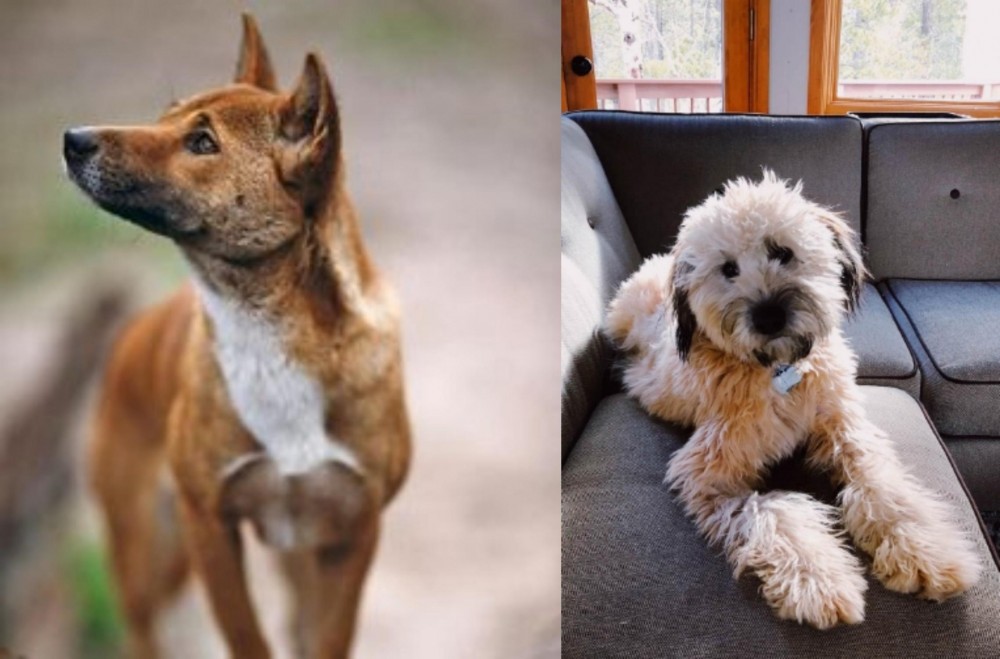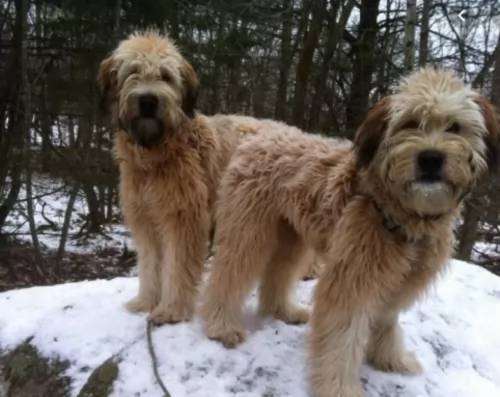 Petzlover
Petzlover New Guinea Singing Dog is originated from Papua New Guinea but Whoodles is originated from United States. New Guinea Singing Dog may grow 12 cm / 4 inches shorter than Whoodles. Both New Guinea Singing Dog and Whoodles are having almost same weight. New Guinea Singing Dog may live 5 years more than Whoodles. Both New Guinea Singing Dog and Whoodles has almost same litter size. Both New Guinea Singing Dog and Whoodles requires Moderate Maintenance.
New Guinea Singing Dog is originated from Papua New Guinea but Whoodles is originated from United States. New Guinea Singing Dog may grow 12 cm / 4 inches shorter than Whoodles. Both New Guinea Singing Dog and Whoodles are having almost same weight. New Guinea Singing Dog may live 5 years more than Whoodles. Both New Guinea Singing Dog and Whoodles has almost same litter size. Both New Guinea Singing Dog and Whoodles requires Moderate Maintenance.
 In 1957 the New Guinea Singing Dog was “discovered” in the Highlands of Papua New Guinea and he is found no where else. There is a lot of debate among scientists, taxonomists and biologist as to what is really a species and what is a subspecies. When the NGSD was found he was classified as a new canid species then in 2007 they were downgraded to a subspecies.
In 1957 the New Guinea Singing Dog was “discovered” in the Highlands of Papua New Guinea and he is found no where else. There is a lot of debate among scientists, taxonomists and biologist as to what is really a species and what is a subspecies. When the NGSD was found he was classified as a new canid species then in 2007 they were downgraded to a subspecies.
Today the NGSD is considered to be a wild dog and a primitive dog. They have lived in Papua New Guinea in the Highlands for thousands of years. They are closely related to other wild dogs, such as Australia’s dingo. They are today as they were a thousand years ago – wild. So wild that many counties have them in their zoos.
With the right care and enough socialization, they do very well as companion animals living with people. They are difficult to domesticate however and the person who owns one should be a part of the NGSD community in order to get support, share issues, and learn from others who have lived with these “wild dogs” for many years.
Any New Guinea Singing Dog found in North America or Europe is a direct descendent of two couples that were taken to zoos in China and Australia. The NGSD makes a howling sound that modulates and undulates through a wide series of tones. No other dog makes this musical sound. Rare even in New Guinea today, the Singer is thought to be the rarest of all dogs.
The only organization that recognizes the Singing Dog is the UKC and they are allowed in UKC competition. The NGSD now holds the classification of a domestic dog – a Canis lupus dingo - which is a subspecies of Canis lupus. In 2016 a group of 15 wild dogs were photographed for the first time ever. Prior to this the NGSD were never seen in more than pairs.
It is believed that they do not live and operate in packs, but rather solitary, pairs or family groups where both the parents do the work of raising the pups.
 Known also as the Wheatenpoo or the Wheatendoodle, the Whoodle is a teddy-bear kind of mixed-breed dog, being a cross between Poodles and the soft-coated Wheaten Terrier.
Known also as the Wheatenpoo or the Wheatendoodle, the Whoodle is a teddy-bear kind of mixed-breed dog, being a cross between Poodles and the soft-coated Wheaten Terrier.
He came about in the mid-1900s so he is still quite a new breed. Like with most hybrid breeds, the Whoodle doesn’t have a well-documented history.
Because most hybrids hail from the USA, one can assume that the Whoodle comes from there as well.
 The New Guinea Singing Dog is a medium sized dog with short legs and a broad head. They are about average height and they are very limber and flexible. They can rotate their paws and spread their legs at much greater angles than the average canine. Thus, they can easily climb a tree. They can jump like a cat.
The New Guinea Singing Dog is a medium sized dog with short legs and a broad head. They are about average height and they are very limber and flexible. They can rotate their paws and spread their legs at much greater angles than the average canine. Thus, they can easily climb a tree. They can jump like a cat.
They have very reflective eyes that are shaped like almonds and have dark rims. The color of the eye can be dark brown to dark amber. It is also believed that they can see better than other domestic dogs in low light settings. Their pupils let in more light due to pupils that are wider than most other dogs.
The ears of the NGSD are lined with fur, pointed and erect. The are forward laying and can be rotated in order to hear even the farthest and faintest of sounds. There are dark guard hairs on the spine and back of the ears and tail. On young dogs the muzzle is black but by age 7 it is already beginning to turn gray.
 The Whoodle is a medium-sized dog that stands at between 30 and 50cm in height and weighs in the region of 9 to 20kg.
The Whoodle is a medium-sized dog that stands at between 30 and 50cm in height and weighs in the region of 9 to 20kg.
He has a silky, medium-length coat that can be fairly straight or wavy and which is available in a range of colors – black, brown, grey, cream and red.
He isn’t a heavy shedder, but their hair can grow fairly long so he will have to be groomed one way or the other. Many people choose to have him trimmed at the doggy salon. With the Poodle being in the mix, it is thought that the Whoodle coat is hypoallergenic, sought after by dog owners who suffer from allergies.
Just because of the dog breeds your Whoodle dog comes from, you can know that you’re going to have a playful, happy, friendly, outgoing, social pet who will have no doubt inherited a lot of good qualities from both parent breeds.
He will happily settle down with you in the city or the countryside. He absolutely loves human company and isn’t the kind of dog to be put outside for hours separated from his humans.
If there are children in the home, they’ll discover that this little dog is always up for a game. He gets on well with children and other pets. Early training and socialization will be imperative for the Whoodle as he is a strong-willed dog, inclined to be stubborn and you want to make sure he is obedient.
 They could be, but it must be remembered that this is a wild dog.
They could be, but it must be remembered that this is a wild dog.
Varying the pitches when howling
It’s possible but not recommended. Leave them wild.
Highly intelligent but trainability is questionable unless well socialize and attached to their people.
 The Whoodle is a hybrid dog – a mix between the soft-coated wheaten terrier and the poodle.
The Whoodle is a hybrid dog – a mix between the soft-coated wheaten terrier and the poodle.
They make splendid pets and companions and are cheerful and intelligent, wanting to be constantly by your side.
Because both of the parents are working dog breeds, he is an active dog too, loving to take part in all the activities his family is busy with.
When you bring this little teddy bear of a dog into your home, you’re going to have years of benefiting from a true canine companion.
 Though the breed is not extinct – it is so wild and secretive that there is no history or record of any health problems. However, the small number of domestic companion animals have shown health issues in recent years.
Though the breed is not extinct – it is so wild and secretive that there is no history or record of any health problems. However, the small number of domestic companion animals have shown health issues in recent years.
Pancreatitis – can be chronic or acute. If chronic it needs to be treated and diet changed. If acute it is usually deadly.
Hip Dysplasia – can cause lameness or arthritis.
 The Whoodle is considered to be a healthy little dog but they can suffer from some of the many common dog illnesses there are. It’s important to feed your dog well and to exercise him to ensure his good health. Some of the common health problems he could suffer with -
The Whoodle is considered to be a healthy little dog but they can suffer from some of the many common dog illnesses there are. It’s important to feed your dog well and to exercise him to ensure his good health. Some of the common health problems he could suffer with -
It is important to ensure your Whoodle has his vaccines to prevent some of the deadly canine diseases there are.
Also, it is a good idea to have your pet neutered or spayed to prevent an unwanted litter. Spaying and neutering have health benefits for your pet, so it is a good idea to have this done for them.
 In the wild both pups and adults are thought to eat small mammals and birds as well as fruits. In homes feed a high protein diet. Because of the tendency toward pancreatitis do not feed raw or under cooked meat. If feeding meet do so in small amounts well cooked, very lean. Stay away from the fat. Feed puppies very small amounts. ¾-1 cup high quality dry puppy food twice a day.
In the wild both pups and adults are thought to eat small mammals and birds as well as fruits. In homes feed a high protein diet. Because of the tendency toward pancreatitis do not feed raw or under cooked meat. If feeding meet do so in small amounts well cooked, very lean. Stay away from the fat. Feed puppies very small amounts. ¾-1 cup high quality dry puppy food twice a day.
Same as the puppy when it comes to meat although you could give the adult a little more. 1 ½ cups od high quality medium breed dog food twice a day.
In the wild there is no indication of health issue. A very healthy breed.
The NGSD needs a lot of stimulation both mental and physical. They must have a daily walk and somewhere to run. They are escape artist in homes. Remember they can jump like cats and climb trees. If their head can pass through a hole, so can the rest of their body.
 Apart from your Whoodle requiring regular nail trimming, you will want to brush him twice a week to keep their coat free from matting. Some Whoodle owners prefer to have their pets professionally groomed.
Apart from your Whoodle requiring regular nail trimming, you will want to brush him twice a week to keep their coat free from matting. Some Whoodle owners prefer to have their pets professionally groomed.
Check inside his mouth while grooming to ensure there are no bad teeth. This could cause your pet a lot of pain and he has no way of telling you this.
As a medium-sized dog, you want to feed your pet a commercially manufactured dog food that has been formulated for a medium-sized dog and one with lots of energy.
Their dietary needs change from puppyhood to adulthood and where the puppy received 4 bowls of food a day, the adult Whoodle will require 2. Always buy the best quality food you can as the choice of food you provide has a huge impact on his health.
Some home-made food is always a good idea too but it needs to be simple and plain, without any exotic spices. Boiled chicken, rice and vegetables is always a splendid choice and it can be added to the dry kibble as a supplement.